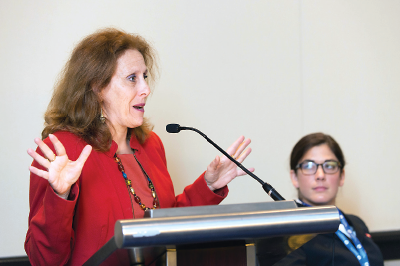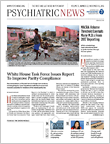Since America’s earliest days, when Molly Pitcher replaced her fallen husband on cannon duty in the Revolutionary War’s Battle of Monmouth, women have played significant roles in the U.S. military.
While women were once limited to serving in supportive roles, the past few decades have seen a shift, as regulations excluding women from combat have been lifted.
Even as the number of women in combat positions climbs, there is little research into how women are affected by combat-associated trauma and stress, which can negatively impact physical, mental, and emotional well-being. The risks facing women in the military and strategies to address these risks were the subject of a workshop at IPS: The Mental Health Services Conference, held last month in Washington, D.C.
“We know this is not a typical talk for IPS, but we think it’s an important topic for discussion,” said retired Army Col. Elspeth Cameron Ritchie, the mental health chief at the Community-Based Outpatient Clinics for the Washington, D.C., Veterans Administration, at the start of her presentation.
Ritchie, who discussed some of the unique medical challenges women in combat deployment face, such as menstruation and genito-urinary and sexual/reproductive issues, was one of five women who brought personal experience and academic expertise to the panel. The panel was composed of veterans who work in positions that support military mental health.
Kate McGraw, Ph.D., interim director of the Deployment Health Clinical Center, which is part of the Defense Centers of Excellence, described firsthand the isolation that women in the military can sometimes face when stepping into roles once filled by men. Back in 1987, McGraw became one of the first female intercontinental ballistic missile launch officers in the Air Force—a pioneering position but one that she said left her feeling isolated.
McGraw described recent studies to suggest a connection between how the brain processes physical and social pain and the importance of social support in protecting women against posttraumatic stress disorder.
Such studies “highlight how important it can be, healthwise, to feel like you belong,” she said. “[M]ilitary leaders should be aware of [the importance of social support] moving forward as women become integrated into combat units.”
McGraw added that ostracism does not just pose negative consequences for the person being excluded; it can potentially drive morale down for the whole unit.
Isolation and lack of support can also increase the risk of suicide in women veterans, explained Jacqueline Garrick, M.S.W., another army veteran and former director of the Defense Suicide Prevention Office.
“Sexual harassment or assault are also linked with suicide, but sexual assault prevention training can be ostracizing for women, because men might think it’s safer to keep their distance,” she said. “It shows how we can do harm even when we try to do good.”
In general, there is limited understanding of the female military experience, Garrick noted. “Given their combat exclusions until recently, female veterans won’t have the same medals or citations in their folders as men, which can be used to identify exposure to stress and trauma, and therefore women’s past history can be more difficult to tease out,” she said.
Developing resiliency programs that connect female military leaders with this new cohort of women in combat could help women to realize they are not alone, she added.
Tracy Koehlmoos, Ph.D., an associate professor and division director of health services administration at the Uniformed Services University of the Health Sciences, talked about the challenges associated with sexual assault in the military. She agreed that more programs and research tailored toward the female military experience are needed.
Paraphrasing a Chinese proverb during her remarks, Koehlmoos said, “If we expect women to hold up half the sky, then we need ongoing programs that specifically address the unique operational and medical needs of the female military population, along with adequate resources and support from leadership.
“As we begin sending more and more women into the theater of combat, we need to make sure they return to us in good health,” she concluded. ■

